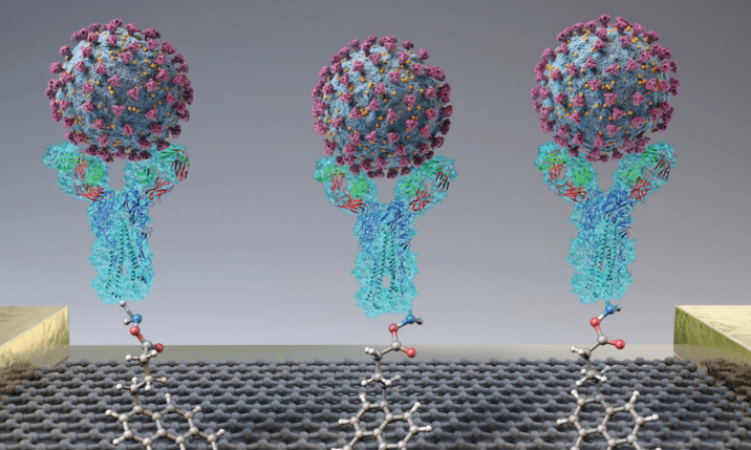
As the BA.5 omicron variant continues to spread, health experts are increasingly preparing for a future in which such COVID-19 variants emerge, surge and recede similar to seasonal flu. An important part of staying on top of these changes will be the ability to quickly monitor the virus at a "population scale," an effort that will require accurate and ultra-fast testing.
As mentioned in Science Daily, researchers from the School of Science at IUPUI are developing a new biosensor with the potential to achieve the speed and efficiency required for the future of COVID-19 testing. It was recently reported in Applied Material Interfaces, a journal of the American Chemical Society. It is led by Rajesh Sardar, a professor of chemistry and chemical biology in the School of Science, and Adrianna Masterson, a graduate student in Sardar's lab at the time of the study.
"Everyone is chasing high-throughput testing; this type of high-speed analysis is essential to the future of the fight against COVID-19," Sardar said. "There are many advantages to our technology in particular: It's fast, efficient, accurate and unprecedentedly sensitive."
In terms of speed, the COVID-19 test from Sardar's lab can currently analyze samples from 96 individuals in under three hours, he said. In terms of efficiency, the system requires only 10 microliters of blood. By comparison, a typical blood panel order by a primary-care physician collects 10 millilitres of blood -- more than 1,000 times more.
Additionally, Sardar said the sensor was found to be highly accurate at measuring the body's COVID-19 antibody concentration. This is because it detects not only the virus's spike protein but also the proteins created by the body to protect against the virus -- immunoglobin G, or IgG.
He also said the ability to measure COVID-19 antibodies is significant because many COVI9-19 antibody tests currently approved under the FDA's emergency use authorization don't provide specific antibody counts, despite the fact that this number indicates the strength of a person's immunity to infection.
"Accurately measuring patients' immunity levels will be critical to protecting against COVID-19 going forward," Sardar said. "This can be seen clearly in our current state of affairs, as variants like omicron -- and, most recently, BA.5 -- are infecting even fully vaccinated and boosted individuals."
To achieve its results, Sardar's lab's biosensor uses chemically synthesized gold triangular nanoprisms, which provide a uniquely powerful optical response to even minuscule amounts of IgG. It also means the sensor can detect antibodies in the earliest stages of infection.
"This research is about preparing for the future," said Sardar, who is also a researcher with the Indiana University Melvin and Bren Simon Comprehensive Cancer Center. "The H1N1 strain of the flu is nearly 100 years old. I expect the coronavirus will also be with us for a long time. Looking ahead, we need to come up with ways to measure many people's infections, or risks of infection, quickly, easily and efficiently in order to stay one step ahead of the virus."
This work was supported in part by the NIH's National Center for Advancing Translational Science through a grant from the Indiana CTSI.
Higher voice pitch lets female faces appear younger: Study
Strokes linked to Depression: Study
Immunotherapy might help to Improve Lung Cancer Treatment: Study